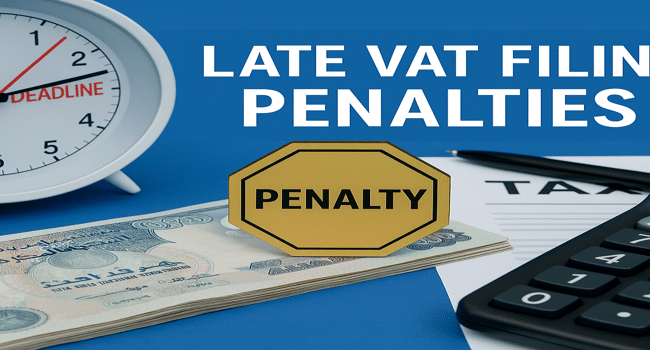Table of Contents
UAE businesses have to regularly monitor Value Added Tax (VAT) given rapidly approaching deadlines and increasing non-compliance penalty. Late VAT filing can lead to significant financial pressure from fixed penalty to daily penalties that accumulate quickly. Knowing these fines and how to avoid them enables one to keep financial health and regulatory compliance.
Major Penalties for Late VAT Filing
1. Fixed Penalties for Late Submission
Late VAT return submissions draw fixed fines from the Federal Tax Authority (FTA). For businesses, first-time violations run AED 1,000; second-time violations within 24 months run AED 2,000 per violation. These penalties apply even if the VAT amount is paid on time but the return is filed late. For example, a business that submits its VAT return one day late incurs an AED 1,000 penalty, regardless of whether the tax was paid promptly.
2. Late Payment Penalties
Penalties increase the longer VAT payments are past due. Two percent of the unpaid tax is calculated the day after the deadline. An additional 4% penalty is imposed should the tax be payable by the seventh day. From the 30th day until 300% of the unpaid tax, a 1% daily penalty runs.
For example, A firm with an unpaid VAT of AED 100,000 due on 1st August incurs fines as follows:
- Payment on 8th August (seven days late) incurs AED 2,000, 2% penalty.
- Payment on 15th August (14 days late): AED 6,000 plus 2% + 4% penalty.
- Payment on 10th September (40 days late): 2% + 4% + (1% x 10 days) = AED 16,000.
- Payment after one year (345 days late): 2% + 4% + (1% × 315 days) = AED 321,000, but capped at 300% of AED 100,000 = AED 300,000.
3. Administrative Penalties for Related Offences
Late filing typically connects to additional compliance issues, hence generating more penalties. Incorrect tax returns, for instance, lead to AED 3,000 for the first penalty and AED 5,000 for 24-month recurrent infractions. Neglecting to maintain records results in AED 10,000 for the first offence and AED 50,000 for later offences. Missing tax invoices might result in AED 5,000 per invoice penalties.
4.Penalty Reduction and Voluntary Disclosures
Filing voluntary disclosures enables businesses discovering errors in VAT records lower penalties. Pre-audit disclosures lower penalties to 5% of the unpaid tax, but post-audit notifications account for 30% of the remaining tax. No declaration raises fines to fifty percent of the past due tax.
Why does Late VAT Filing happen?
VAT returns are due 28 days after the tax period, hence misunderstanding dates is a common pitfall; for instance, April 28 for a March tax period. Another frequent error is cash flow mismanagement, which delays VAT payments in order to address financial issues. Bad record-keeping including errors in input/output VAT reconciliation or invoice documentation also leads to noncompliance. Overdependence on internal staff without VAT understanding also causes mistakes.
Strategies to Avoid Penalties for Late VAT Filing
- Create a VAT Compliance Calendar to track deadlines using digital reminders or accounting software. Set up alerts, for example, for VAT return filings and payment due dates.
- Automated VAT calculations: FTA-approved accounting solutions streamline VAT calculations, account reconciliation, and generation of compliant invoices.
- Prepare for VAT responsibilities: Set a certain VAT payment sum to avoid delays caused by cash flow issues.
- Conduct Regular Audits: Internal audits let FTA enquiries identify discrepancies in VAT returns or documentation.
- Request VAT experts: Engage professionals to navigate challenging circumstances such Designated Zone transfers or reverse charge processes, which carry penalties of 50% of unpaid tax or AED 50,000.
Long-Term Consequences of Repeated Offenses
Apart from financial penalties, late VAT filing might trigger FTA court action for businesses with significant outstanding VAT. Non-compliant businesses erode confidence among consumers and suppliers, therefore generating reputational damage. Increased audit scrutiny is another risk; continuous errors alert FTA audits, which are costly and labour-intensive.
Conclusion
Late VAT reporting penalties in the UAE are aimed to encourage compliance even if preventative measures might help to avoid them. Should companies manage the complexity of VAT regulations, they must give considerable importance to proper record-keeping, timely filings, and professional counsel. Combining these strategies enables companies to maintain seamless operations and safeguard their financial state.
Consult a VAT specialist for tailored help with VAT Registration UAE to ensure compliance with evolving FTA regulations and to address non-compliance issues.
Read more on KulFiy
